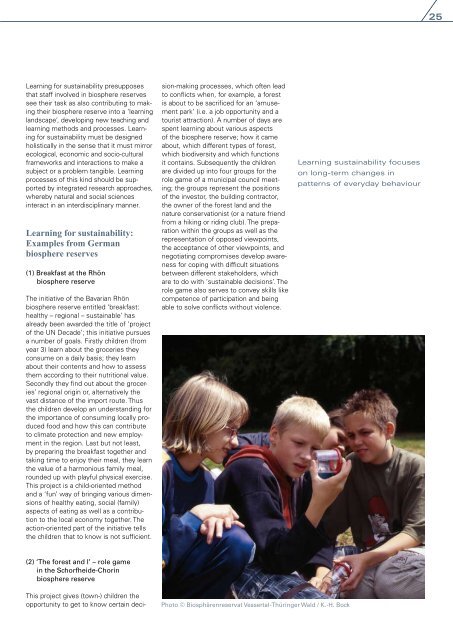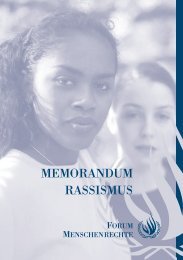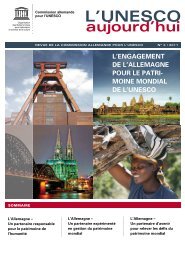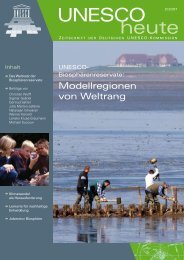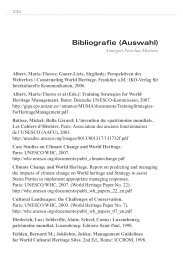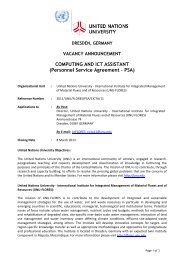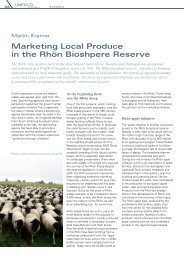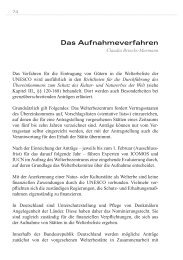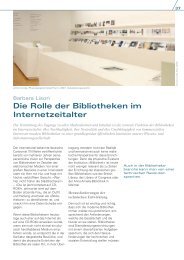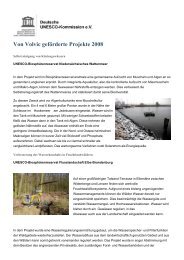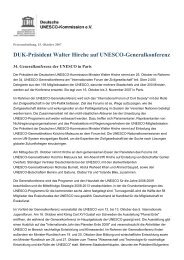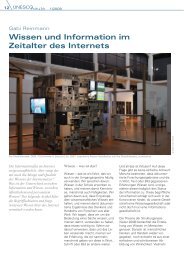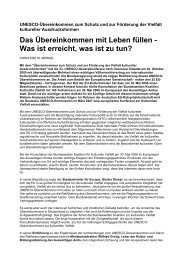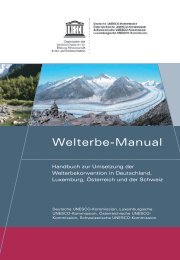Biosphere Reserves - UNESCO Deutschland
Biosphere Reserves - UNESCO Deutschland
Biosphere Reserves - UNESCO Deutschland
Create successful ePaper yourself
Turn your PDF publications into a flip-book with our unique Google optimized e-Paper software.
Learning for sustainability presupposes<br />
that staff involved in biosphere reserves<br />
see their task as also contributing to making<br />
their biosphere reserve into a ‘learning<br />
landscape’, developing new teaching and<br />
learning methods and processes. Learning<br />
for sustainability must be designed<br />
holistically in the sense that it must mirror<br />
ecological, economic and socio-cultural<br />
frameworks and interactions to make a<br />
subject or a problem tangible. Learning<br />
processes of this kind should be supported<br />
by integrated research approaches,<br />
whereby natural and social sciences<br />
interact in an interdisciplinary manner.<br />
Learning for sustainability:<br />
Examples from German<br />
biosphere reserves<br />
(1) Breakfast at the Rhön<br />
biosphere reserve<br />
The initiative of the Bavarian Rhön<br />
biosphere reserve entitled ‘breakfast:<br />
healthy – regional – sustainable’ has<br />
already been awarded the title of ‘project<br />
of the UN Decade’; this initiative pursues<br />
a number of goals. Firstly children (from<br />
year 3) learn about the groceries they<br />
consume on a daily basis; they learn<br />
about their contents and how to assess<br />
them according to their nutritional value.<br />
Secondly they find out about the groceries’<br />
regional origin or, alternatively the<br />
vast distance of the import route. Thus<br />
the children develop an understanding for<br />
the importance of consuming locally produced<br />
food and how this can contribute<br />
to climate protection and new employment<br />
in the region. Last but not least,<br />
by preparing the breakfast together and<br />
taking time to enjoy their meal, they learn<br />
the value of a harmonious family meal,<br />
rounded up with playful physical exercise.<br />
This project is a child-oriented method<br />
and a ‘fun’ way of bringing various dimensions<br />
of healthy eating, social (family)<br />
aspects of eating as well as a contribution<br />
to the local economy together. The<br />
action-oriented part of the initiative tells<br />
the children that to know is not sufficient.<br />
(2) ‘The forest and i’ – role game<br />
in the Schorfheide-Chorin<br />
biosphere reserve<br />
This project gives (town-) children the<br />
opportunity to get to know certain deci-<br />
sion-making processes, which often lead<br />
to conflicts when, for example, a forest<br />
is about to be sacrificed for an ‘amusement<br />
park’ (i.e. a job opportunity and a<br />
tourist attraction). A number of days are<br />
spent learning about various aspects<br />
of the biosphere reserve; how it came<br />
about, which different types of forest,<br />
which biodiversity and which functions<br />
it contains. Subsequently the children<br />
are divided up into four groups for the<br />
role game of a municipal council meeting;<br />
the groups represent the positions<br />
of the investor, the building contractor,<br />
the owner of the forest land and the<br />
nature conservationist (or a nature friend<br />
from a hiking or riding club). The preparation<br />
within the groups as well as the<br />
representation of opposed viewpoints,<br />
the acceptance of other viewpoints, and<br />
negotiating compromises develop awareness<br />
for coping with difficult situations<br />
between different stakeholders, which<br />
are to do with ‘sustainable decisions’. The<br />
role game also serves to convey skills like<br />
competence of participation and being<br />
able to solve conflicts without violence.<br />
Photo © Biosphärenreservat Vessertal-Thüringer Wald / K .-h . Bock<br />
Learning sustainability focuses<br />
on long-term changes in<br />
patterns of everyday behaviour


